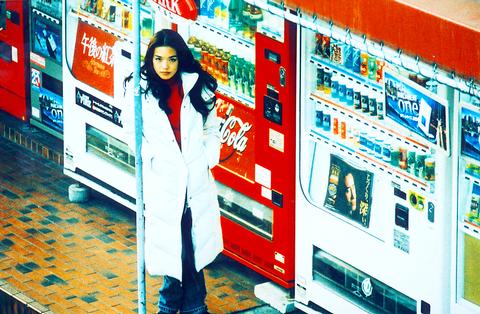For anyone familiar with Taipei nightlife, the scenes in Millennium Mambo -- The Vicky Story (千禧曼波-薔薇的名字), the new movie by Hou Hsiao-hsien (侯孝賢), will seem all too familiar.
This is a story about a Linsen North Road (林森北路) bar hostess named Vicky, who, like many young women in Taiwan, hangs out with her men and friends at Taipei's so-called Yao-tou Bars (搖頭店), or techno dance clubs, popping Ecstasy pills by the palm full.
It's also a story about Vicky's memories about her neurotic and jealous live-in boyfriend Hao-hao (豪豪) who constantly suspects her faithfulness, and about a man named Jack, a gangster big shot who engages an ambiguous love affair with her after meeting in a bar partially owned by him.

PHOTO COURTESY OF SINOMOVIE
The story weaves in and out of spots such as Spin, the Underworld and Texound, as Vicky meets two Japanese DJs who came to Taiwan to learn Chinese and Jack's bar ultimately is busted by the police because of drugs. It should come as little surprise that, according to director Hou, the film is based on the true story of a Taiwanese girl.
"Looking at the young friends around me, I find that their life cycle and rhythm, birth, aging, illness and death move several times faster than those of my generation. This is particularly true among young girls: like flowers, they fade almost immediately upon blooming. The process occurs in an instant," Hou said.
Hou, a frequent winner at international film festivals, has been noted for his unique cinematic language: the long-take, the refined camera and character blocking and the realism of his mis en scene. His last movie Flowers of Shanghai (海上花) was about the lives of men and women in a high-class brothel in Shanghai in the early 1930s. Three years later, Hou is back with a purely Taiwanese, contemporary experience, and he is taking this work to the Cannes Film Festival, which begins next week. Millennium Mambo -- The Vicky Story will take part in the feature films competition at the festival.
In The Vicky Story, unlike in his previous works which usually had only a vague focus on the characters, Hou takes a close look at the life of one girl -- Vicky, played by Shu Qi (舒淇). Having starred in dozens of Hong Kong films and now being one of the highest-priced Taiwanese movie stars, Shu will get a chance with this roleto prove her acting is as worthy of attention as her pretty face and model's figure.
According to Hou, Shu is one of the few actors who can act naturally and precisely under his trademark long-take shots.
"I was surprised by her performances. She gave me a feeling that I should have met this actress earlier," Hou was quoted recently as saying in Chinese-language media.
Collaborating with Hou in The Vicky Story is his long-time cinematographer Lee Ping-bing (李屏賓), who brings out a flashy but decaying feeling to urban Taipei. Lee worked with Hou since City of Sadness in 1988.
Millennium Mambo -- The Vicky Story is one part of Hou's Millennium Mambo series in which he intends to record the changing lifestyles of people in Taiwan. Apart from the The Vicky Story, there are five more scripts ready to be shot. On Hou's own movie Web site, the director is soliciting more scripts and volunteer actors to participate in the making of the series. Footage and synopses of the six stories can already be viewed at http://www.sinomovie.com.

June 23 to June 29 After capturing the walled city of Hsinchu on June 22, 1895, the Japanese hoped to quickly push south and seize control of Taiwan’s entire west coast — but their advance was stalled for more than a month. Not only did local Hakka fighters continue to cause them headaches, resistance forces even attempted to retake the city three times. “We had planned to occupy Anping (Tainan) and Takao (Kaohsiung) as soon as possible, but ever since we took Hsinchu, nearby bandits proclaiming to be ‘righteous people’ (義民) have been destroying train tracks and electrical cables, and gathering in villages

Dr. Y. Tony Yang, Associate Dean of Health Policy and Population Science at George Washington University, argued last week in a piece for the Taipei Times about former president Ma Ying-jeou (馬英九) leading a student delegation to the People’s Republic of China (PRC) that, “The real question is not whether Ma’s visit helps or hurts Taiwan — it is why Taiwan lacks a sophisticated, multi-track approach to one of the most complex geopolitical relationships in the world” (“Ma’s Visit, DPP’s Blind Spot,” June 18, page 8). Yang contends that the Democratic Progressive Party (DPP) has a blind spot: “By treating any

This year will go down in the history books. Taiwan faces enormous turmoil and uncertainty in the coming months. Which political parties are in a good position to handle big changes? All of the main parties are beset with challenges. Taking stock, this column examined the Taiwan People’s Party (TPP) (“Huang Kuo-chang’s choking the life out of the TPP,” May 28, page 12), the Democratic Progressive Party (DPP) (“Challenges amid choppy waters for the DPP,” June 14, page 12) and the Chinese Nationalist Party (KMT) (“KMT struggles to seize opportunities as ‘interesting times’ loom,” June 20, page 11). Times like these can

Swooping low over the banks of a Nile River tributary, an aid flight run by retired American military officers released a stream of food-stuffed sacks over a town emptied by fighting in South Sudan, a country wracked by conflict. Last week’s air drop was the latest in a controversial development — private contracting firms led by former US intelligence officers and military veterans delivering aid to some of the world’s deadliest conflict zones, in operations organized with governments that are combatants in the conflicts. The moves are roiling the global aid community, which warns of a more militarized, politicized and profit-seeking trend